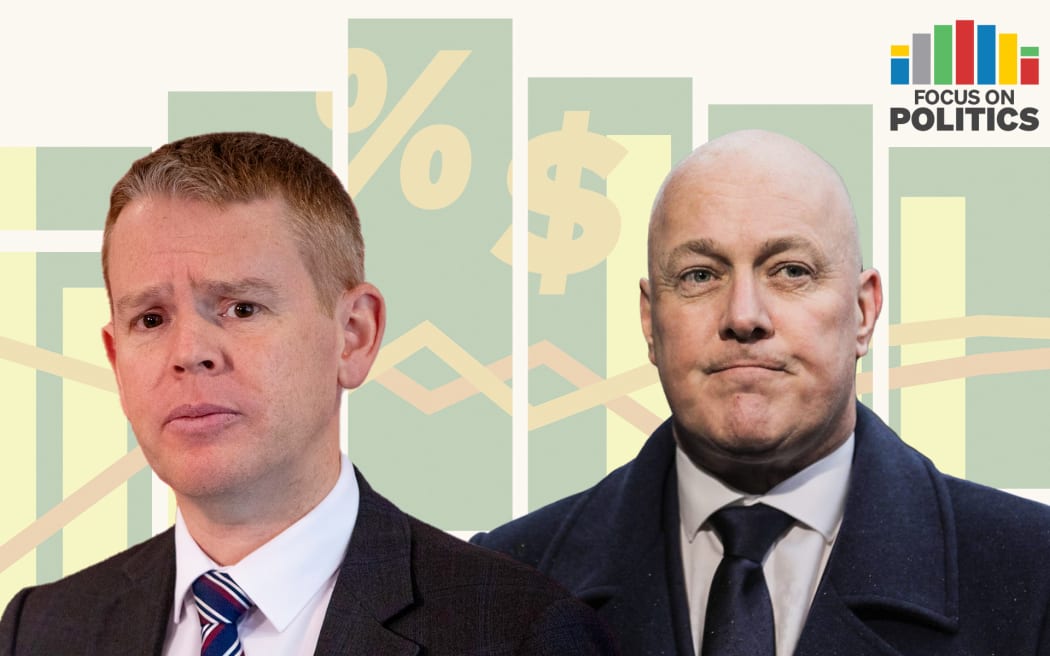
Photo: RNZ
"There is no clear winner coming out of any of the opinion polls at the moment and that means that it's game on," - Chris Hipkins
With recent polling giving both major parties cause for concern and the election less than three months away, the countdown is on - and the policies are starting to roll out.
Labour has launched accusations of fiscal mismanagement over one of National's this week, but had to defend against the same after worsening economic forecasts.
National's leader Christopher Luxon started the week with a 10-year, nearly $25b plan promising a suite of new roads and rapid transit in Auckland.
Labour's Transport Minister David Parker was soon crying foul on National's costings, saying they did not take inflation costs into account and were in some cases years out of date; he estimated just four of the 13 new roads were between $2.4b and $4.8b short based on the latest costings.
National said it used officially provided costings, and lambasted Labour's own financial nous - but the question of how that shortfall would be filled remained unanswered.
That was the first "fiscal hole" of the week, a callback to Steven Joyce's dubious 2017 accusation that Labour was $11.7b short in funding its promises, and Labour's 2020 better-received accusation in return.
National says its 2023 transport policy would be funded from three sources: taxes, reallocations, and $9.5b in private equity. Hipkins targeted the latter on Tuesday to reveal the week's second "fiscal hole" - a rather ambitious use of the phrase.
"The National Party now appear to have a $10b hole in their transport plans, where they think the Infrastructure Commission can just magic up $10b out of nowhere," he said. "Even if it was coming through things like private equity, through public private partnerships, end of the day someone's still got to pay for that."
Luxon argued sovereign wealth and pension funds like NZ Super were "awash with cash" and keen to invest in New Zealand infrastructure projects through public-private partnerships and value capture (like toll roads). Targeted rates and other alternative funding methods offered other options. Taxpayers would still end up paying, it seemed, just not so much through taxes.
"The New Zealand public are up for that - they want the infrastructure built," Luxon said.
National would also scrap Auckland light rail, and the Let's Get Wellington Moving programme. While local politicians went into bat for them, it was Parker's refusal on Monday to do the same that had reporters questioning if the projects were doomed under either major party.
Prime Minister Chris Hipkins' post-Cabinet media briefing later in the day offered little more illumination, and it was not until Tuesday the party clarified its position: Labour still supported both - but with possible changes.
Read more:
- Game on: Political parties solidify allegiances as election beckons
- National leads Labour in new Newshub-Reid poll
- National, ACT could form government - latest 1News-Verian poll
- Major parties offer explanations after transport policy diversions
- Hipkins backs light rail for Auckland in wake of National's plan to axe it
- National proposes new highways, Labour dubious on cost estimates
National faced further fiscal criticism on Tuesday, with the Council of Trade Unions accusing the party of a $3.3b to $5.2b shortfall in its tax and spending plans. The party did not address the substance of the claims but it has not yet released its fully costed tax policy, so this third fiscal hole accusation of the week must be taken with a grain of salt. Finance spokesperson Nicola Willis dismissed it as a political hit job from the Labour-aligned union.
Fiscal hole number four was more concrete, but hardly a smoking gun. Accusations from National, ACT and NZ First warned that the government's books were short by varying amounts - up to $30b in some press releases. These were accompanied by claims that public sector bosses were being called into meetings demanding they meet savings targets.
Finance Minister Grant Robertson acknowledges tax revenue is lower than forecast - likely to be confirmed in Treasury's September pre-election fiscal update - but rejects the amount, or that it's particularly unusual.
"That is a fanciful number ... at the Budget we established a savings and efficiency programme that we are working with the public service on," he told reporters. "New Zealand's books are in good shape ... what we have seen is that the revenue forecasts that the Treasury Budget had in May, when we came to see the government accounts in July they had not been met. We will see at PREFU ... if that situation persists."
Hipkins called it 'farcical', and the fiscal hole frenzy eventually culminated in a Question Time double entendre, with Willis asking Robertson "how big is his hole" to guffaws across the House.
Whether any of this resonated with the public is still unknown, but a poll on Wednesday evening clarified the state of play and set off another round of pre-coalition courtships.
Newshub-Reid Research reported a 3.6-point drop for Labour, a significant slide that continues a trend from other pollsters. The party is relying on Chris Hipkins being a likeable guy and making the most of the pie-loving Hutt boy persona, but there's been a lot of collateral damage this year. They got a bump with the leadership change and the razor taken to spending, but scandals and controversies have taken their toll.
National has however failed to properly capitalise on Labour's woes, and Luxon's personal popularity continues to stagnate - it was mostly the minor parties picking up the slack. There's a palpable sense many voters are disillusioned with both main parties, and looking for credible alternatives. ACT is providing a seemingly popular alternative to those not convinced by the pitch from National and its leader.
With a 1.1-point gain Winston Peters' NZ First is also looking within reach of the 5 percent threshold to get back into Parliament. Luxon has been careful to keep his options open there, but he would likely also need ACT whose leader David Seymour again made his position clear this week: he would not sit across the Cabinet table with NZ First.
The campaign will draw direct focus on the leaders, the two Chrises as they hit the trail, but voters will be looking for more than photo ops to decide who they will trust to run the country for the next three years.
In this week's Focus on Politics, Political Editor Jane Patterson tallies the numbers on Labour and National's economic claims and electoral chances.
Listen free to Focus on Politics on Apple Podcasts, on Spotify, on iHeart Radio or wherever you get your podcasts.


